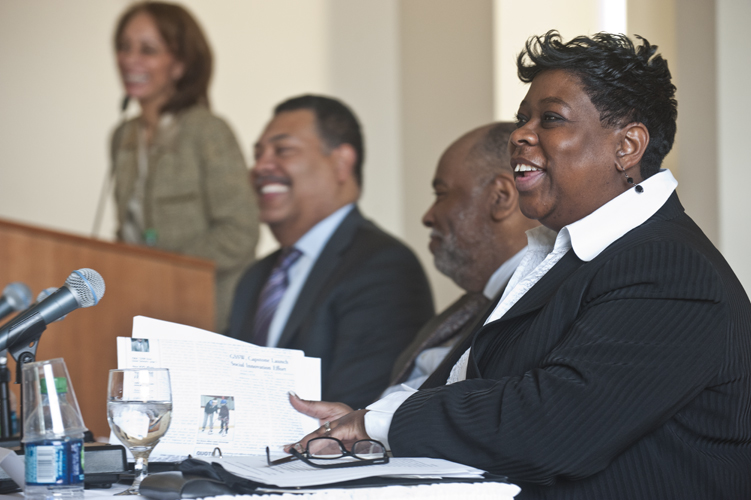
By
As a Boston College undergraduate, University Trustee Darcel Clark ’83 made a yearly trek each January to Washington, DC, joining thousands of others in urging Congress to establish the birthday of Martin Luther King Jr. as a national holiday.
It may have been a symbolic victory, but the success in memorializing King’s birthday was a milestone in the struggle for civil rights, said Clark at a panel discussion held Friday in the Yawkey Center Murray Room as part of the University’s 30th anniversary Martin Luther King Jr. Scholarship Ceremony.
“We’ve come a long way, and there is still a ways to go,” said Clark, a New York State Supreme Court justice, “but all of these steps are important.”
Joining Clark — who was the inaugural winner of the BC Martin Luther King Jr. Scholarship in 1982 — on the panel were BC Law Dean Vincent Rougeau and Campus Minister Rev. Howard McLendon ’75, with Assistant Law Dean Tracey West serving as moderator. With King’s legacy serving as a thematic backdrop, the panelists offered their views on contemporary issues of economic justice and civil rights.
The tribute to King continued later that afternoon, as Harvard Law Professor Charles Ogletree presented a talk in Robsham Theater prior to the awarding of the 2012 King Scholarship to Sandra Dickson [see separate story].
Responding to a question by West on the definition of economic justice, Rougeau said an economic system based on fairness “is designed to serve people, not the other way around. When we see the economy dehumanizing and marginalizing families and individuals — instead of empowering them — then we have a problem.”
In a discussion about the role of education in economic justice and civil rights, Rev. McLendon said, “The degree of economic success we’ve been afforded is tied to educational opportunities. What should be of concern to us is we have generations who are not being prepared to pursue higher education. That is a serious obstacle to achieving economic justice.”
Clark affirmed the role of King and the civil rights movement in bringing about change. “Without Dr. King, Lyndon Johnson would not have been pushed to ensure the Civil Rights Act was passed, which made such a difference not only in voting rights but in housing, employment and other critical areas. It was the culmination of the movement.”
Legislative and legal resources have been, and continue to be, necessary to achieve the aims of this landmark act, she said. “We had to work on it, to make sure the law was enforced. Law is a powerful force to get things done.”



